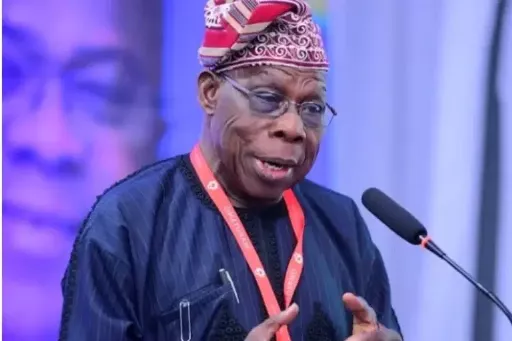Former President Olusegun Obasanjo has said Nigeria’s constitutional challenges are less about the document itself and more about those entrusted with its implementation.
Obasanjo made this known on Wednesday during the opening of a three-day National Summit on the Future of Nigeria’s Constitutional Democracy, organised by The Patriots in collaboration with the Nigeria Political Summit Group, in Abuja.
Speaking through the Secretary-General of Eminent Patriots, Mr. Olawale Okunniyi, Obasanjo stated that while constitutions must reflect the history, constituents, and aspirations of a people, there is no such thing as a flawless document.
“From my experience in operating our constitution, I will be the first to point out some areas of our constitution that need amendment. However, for me, no constitution can ever be regarded as perfect,” he said.
According to him, the success or failure of any constitution depends significantly on the people tasked with its implementation.
“But whatever the strength or weakness of a constitution, the most important issue, to my own understanding and experience, is the operators of the constitution.
“The best constitution can be perverted and distorted by the operators and we have experienced that all over Africa, Nigeria not exempted.
“I am more concerned about the operators of the constitution to lead in good governance and promotion of welfare and wellbeing of the citizenry,” he said.
Obasanjo noted that regardless of any amendments made, if the same individuals continue to operate the constitution without a change in mindset or conduct, citizens will remain at the receiving end.
“No matter what you do to Nigerian constitution, if the operators of the constitution, for the past one decade and a half, remain unchanged and continue in the same manner, the welfare and wellbeing of Nigerians will continue to be sacrificed on the altar of selfishness.
“It will continue to be sacrificed on the altar of self-centeredness, corruption, impunity and total disregard of the constitution, decency, morality, integrity and honesty,” he added.
Also speaking at the summit, former Governor of Akwa Ibom State, Obong Victor Attah, in a speech read by Okunniyi, rejected the legitimacy of the 1999 Constitution, describing it as a product of military imposition rather than a reflection of the people’s will.
Attah stated that the summit was more than another conference—it was a necessary confrontation of Nigeria’s constitutional contradictions.
“The military suspended the 1963 Constitution which remains the last legal expression of our people’s collective will and agreed terms of condition for staying together,” he said.
He called for a return to true federalism and restructuring along the lines of equity, justice, and mutual consent.
“We, from the South-South region, join other zones across this country who now agree that this union is not working as it is.
“It can only be sustained if it is restructured on the basis of equity, justice and mutual consent,” he said.
According to Attah, the country’s democratic system is dysfunctional, and trust in governance is eroding due to the departure from a federal to a presidential unitary system.
“Sovereignty must return to the people. We must get rid of this unitary system and reinstate the federal system of governance that our founding fathers had agreed to.
“True federalism must guarantee maximum autonomy to the federating units.
“Cost of politics must be brought down to open space for inclusiveness and real leadership.
“Unicameral legislature with ministers appointed only from elected representatives,” he added.
He urged Nigerians to seize the moment to initiate change.
“We must not be afraid to change, rather be afraid not to change.
“Nigeria’s unity will only be preserved through fairness and justice – not force or fear.
“And if we miss this opportunity, the next chapter may be one of irreversible fragmentation. I believe and I know many of you also believe, that time is running out,” he said.
Senator Gbenga Daniel, Co-Chairman of the Organising Committee, described the summit as a landmark citizen-driven initiative born out of persistent advocacy and consultations.
“This summit is a citizen-driven constitutional intervention, stemming from months and even years of relentless advocacy, extensive consultations and a growing sense of public urgency,” he said.
Daniel, who chairs the Senate Committee on Navy, said the current structure based on the 1999 Constitution has failed to address key national challenges.
“Our agenda for the coming days is ambitious but aims to be straightforward and focused,” he added.
He listed the summit’s core areas of deliberation to include the organisation and structure of the Nigerian federation, the role of local governments and traditional institutions, resource control and fiscal federalism, as well as electoral and judicial reforms.
Daniel emphasized that the summit aims to include all Nigerians, regardless of age, region, or background.
“More importantly, we will work diligently to ensure that no voice is too small and that no group is left behind.
“This summit is multi-generational, spanning different regions, and inclusive of various sectors, truly embodying the Nigeria we aspire to build,” he said.
He called on youths, women, civil society actors, and traditional and religious leaders to actively participate in shaping the nation’s future.
Daniel said resolutions from the summit would be compiled, refined, and presented to the Presidency and the National Assembly.
“Our intention is not to foster confrontation but to promote constructive collaboration and mutual understanding.
“It is imperative that we persuade our leaders—through reasoned argument, consensus-building and compelling evidence—that Nigeria is in dire need of a new constitutional framework that reflects the aspirations and realities of all its citizens,” he stated.


